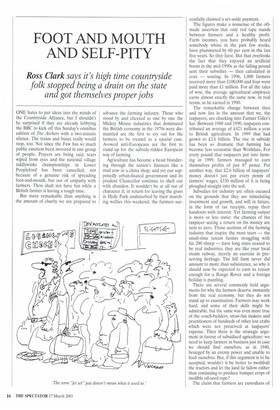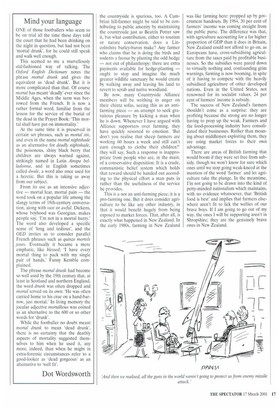FOOT AND MOUTH AND SELF-PITY
Ross Clark says it's high time countryside
folk stopped being a drain on the state and got themselves proper jobs
ONE hates to put ideas into the minds of the Countryside Alliance, but I shouldn't be surprised if they are already lobbying the BBC to kick off this Sunday's omnibus edition of The Archers with a two-minute silence. The trains and buses really would stop, too. Not since the Few has so much public emotion been invested in one group of people. Prayers are being said, tears wiped from eyes and the national village tiddlywinks championships in Lower Poopleford has been cancelled, not because of a genuine risk of spreading foot-and-mouth, but out of empathy with farmers. Thou shalt not have fun while a British farmer is having a tough time.
But more remarkable than anything is the amount of charity we are prepared to advance the farming industry. Those who stood by and cheered as one by one the Mickey Mouse industries that dominated the British economy in the 1970s were dismantled are the first to cry out for the farmers to be treated as a special case. Avowed anti-Europeans are the first to stand up for the subsidy-ridden European way of farming.
Agriculture has become a beast blundering through the nation's finances like a mad cow in a china shop; and yet our supposedly urban-fixated government and its prudent Chancellor continue to shell out with abandon. It wouldn't be at all out of character if, in return for leaving the grass in Hyde Park undisturbed by their marching wellies this weekend, the farmers sue cessfully claimed a set-aside payment.
The figures make a nonsense of the oftmade assertion that only red tape stands between farmers and a healthy profit. Farm incomes, you have probably heard somebody whine in the past few weeks, have plummeted by 60 per cent in the last five years. So they have. But that overlooks the fact that they enjoyed an artificial boom in the mid-1990s as the falling pound sent their subsidies — then calculated in ecus — soaring. In 1996, 1,800 farmers received more than £100,000 and four were paid more than £1 million. For all the tales of woe, the average agricultural employee earns almost exactly the same now, in real terms, as he earned in 1990.
The remarkable change between then and now lies in the amount that we, the taxpayers, are chucking into Farmer Giles's hat. Between 1988 and 1990, taxpayers contributed an average of £421 million a year to British agriculture. In 1999 that had grown to £2.6 billion. The rise in subsidy has been so dramatic that farming has become less economic than Workfare. For every pound that taxpayers put into farming in 1999, farmers managed to earn themselves profits of just 87 pence. Put another way, that £2.6 billion of taxpayers' money doesn't just pay every penny of farmers' wages; £330 million of it is being ploughed straight into the soil.
Subsidies for industry are often excused on the grounds that they are stimulating investment and growth, and will in future, in the form of tax receipts, repay their handouts with interest. Yet farming output is more or less static: the chances of the taxpayer seeing a return on his money are next to zero. Those sections of the farming industry that inspire the most tears — the small-time tenant farmer struggling with his 200 sheep — have long since ceased to be real industries; they are like your local steam railway, merely an exercise in preserving heritage. The hill farm never did amount to more than subsistence, so why it should now be expected to earn its tenant enough for a Range Rover and a foreign holiday is puzzling.
There are several commonly held arguments for why the farmers deserve immunity from the real economy, but they do not stand up to examination. Farmers may work hard, and some of their skills might be admirable, but the same was even more true of the coach-builders, straw-hat makers and practitioners of hundreds of other lost crafts which were not preserved at taxpayers' expense. Then there is the strategic argument in favour of subsidised agriculture: we need to keep farmers in business just in case we should find ourselves, as in 1940, besieged by an enemy power and unable to feed ourselves. But, if this argument is to be accepted, wouldn't it be better to mothball the tractors and let the land lie fallow rather than continuing to produce bumper crops of inedible oil-seed rape?
The claim that farmers are custodians of the countryside is spurious, too. A Cumbrian hill-farmer might be said to be contributing to public amenity by maintaining the countryside just as Beatrix Potter saw it, but what contribution, either to tourism or nature conservation, does a Lincolnshire barley-baron make? Any farmer who claims that he is doing the birds and rodents a favour by planting the odd hedge — not out of philanthropy: there are extra payments available for hedge-planting — ought to stop and imagine the much greater wildlife sanctuary he would create by walking away and leaving his land to revert to scrub and native woodland.
By now, many Countryside Alliance members will be writhing in anger on their chintz sofas, seeing this as an antifarming piece — an attempt to seek gratuitous pleasure by kicking a man when he is down. Whenever I have argued with Alliance supporters over farming, they have quickly resorted to emotion. 'But don't you realise that sheep farmers are working 60 hours a week and still can't earn enough to clothe their children?' they will say. Such a response is inappropriate from people who are, in the main, of a conservative disposition. It is a crude, communistic belief system which holds that reward should be handed out according to the physical effort a man puts in rather than the usefulness of the service he provides.
This is a not an anti-farming piece: it is a pro-farming one. But it does consider agriculture to be like any other industry, in that it would benefit hugely from being exposed to market forces. That, after all, is exactly what happened in New Zealand. In the early 1980s, farming in New Zealand was like farming here: propped up by government handouts. By 1984, 30 per cent of farmers' income was coming straight from the public purse. The difference was that, with agriculture accounting for a far higher proportion of GDP than it does in Britain, New Zealand could not afford to go on, as Europeans have, cross-subsidising agriculture from the taxes paid by profitable businesses. So the subsidies were pared down to virtually nothing and, confounding grim warnings, farming is now booming, in spite of it having to compete with the heavily subsidised agriculture of other developed nations. Even in the United States, not renowned for its socialist values, 24 per cent of farmers' income is subsidy.
The success of New Zealand's farmers shouldn't come as a surprise: they are profiting because the strong are no longer having to prop up the weak. Farmers and the food-processing industry have consolidated their businesses. Rather than moaning about middlemen exploiting them, they are using market forces to their own advantage.
There are areas of British farming that would boom if they were set free from subsidy, though we won't know for sure which ones until we stop going weak-kneed at the mention of the word 'farmer' and let agriculture take the plunge. In the meantime, I'm not going to be drawn into the kind of petty-minded nationalism which maintains, with no evidence whatsoever, that 'British food is best' and implies that farmers elsewhere aren't fit to lick the wellies of our brave boys. If I am going to go out of my way, the ones I will be supporting aren't in Shropshire; they are the genuinely brave ones in New Zealand.



































































 Previous page
Previous page